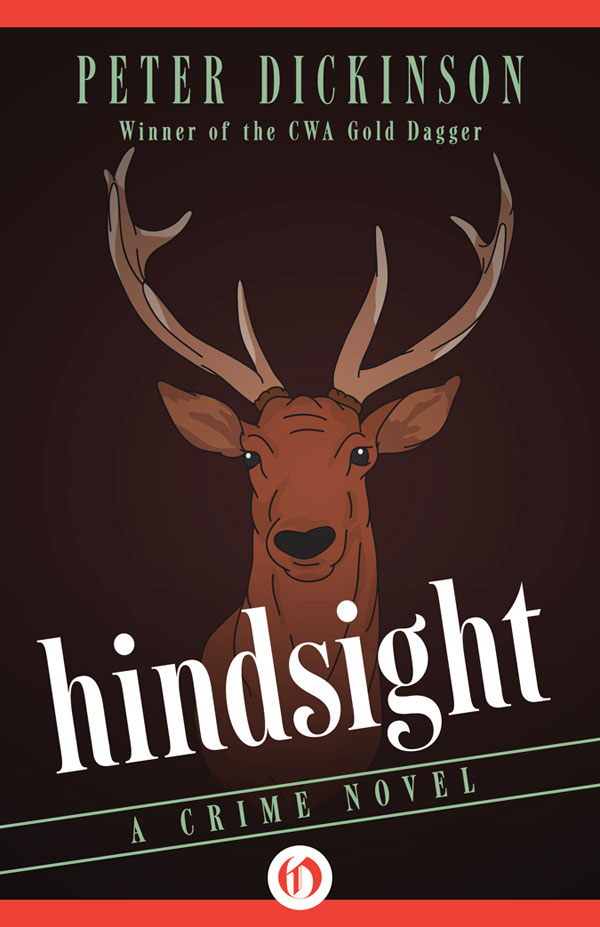Hindsight
Authors: Peter Dickinson



FRESH EBOOK DEALS, DELIVERED DAILY
BE THE FIRST TO KNOW ABOUT
FREE AND DISCOUNTED EBOOKS
NEW DEALS HATCH EVERY DAY
Hindsight
A Crime Novel
Peter Dickinson

1
T
his is a murder story.
There is a nasty death, there are clues, and a solution of sorts. In that way it is no different from the type of book I have written before, or from the type of book I thought I was writing when I began.
But in other ways it couldn't be more different, because it is true. True, at least, as I have been able to make it. The death of Christopher Wither did take place.
Or rather, exactly such a death took place, but the dead man had a different name.
Damn. Try again.
I began to write a straightforward detective story, using my own prep-school days as a background. In the course of doing thisâpartly because I was presented with fresh information, but mainly by reviving lost memories and then thinking about themâI came to believe that the actual events in which I had taken part as a child were capable of a much more sinister interpretation than I had realised at the time, or had since thought. Not that I had thought about them much, if at all, during the forty-year interval, despite it having been myself who found the body and who gave evidence at the inquest. The reasons for this blanking-out of memory will become apparent, as they slowly did to me. They are part of what this book has turned out to be about.
Having decided what the truth probably was, I could not go blandly on with my half-completed fiction. I felt I had to get the truth down on paper as best I could. But much of the evidence for that truth was embedded in what I had already written, details and incidents I had used for decoration or to support my fictional plot. These are often the âclues' to which I referred just now. The only answer seemed to be to incorporate the relevant bits of my manuscript into a new book.
This is why the book you have in your hands could be said to consist of the first halves of two murder stories, one working forward in time and one backward, meeting and culminating in one death. So the death comes later in the book than is normal in the genre, and I think it might help readers to have this explanatory note at the start.
I have done my utmost to keep things simple. I am not trying to dazzle the literary world with a bag of tricks, only to tell a story in the way it happened. For simplicity's sake I have sometimes compromised with truth. Take the matter of names, for example. When I started writing my fiction I gave all the characters, though based on real people, fictional names. So really all the characters and places in this book should have two names apiece, one fictional and one real. To avoid this confusion I have used the fictional names throughout. This wasn't done to protect the innocentâthere were precious few of them about, it turned out. For the sake of consistency, I have also altered my own name. My novel is set in the third person, and experienced by a boy called Paul Rogers, so the non-fictional part now conforms to it and describes the discoveries and self-discoveries of a middle-aged writer also called Paul Rogers,
alias âI'.
That is a simple confusion, simply resolved. I myself am much more bewildered by the question how much of what I âremember' is genuine historical fact. This is vital, because on it depends the validity of many of my âclues'. To illustrate the problem, and also by way of scene-setting, I will begin with three brief episodesânot in fact part of my half-completed fictionâthat took place during the evacuation of St Aidan's Preparatory School from Sussex to Devon during the summer of the fall of France.
First comes something that has always for some reason stuck in my mind: the memory consists of the weight and ungraspability of a mattressâblack-striped ticking stuffed with horsehair and buttoned with serrated leather roundels. As I type my thumb muscles ache faintly with the remembered effort not to let it slip as I carried it across the Second XI pitch to the removal vans. The Man was there, watching the work. He singled me out and said, âWell done, Rogue,' as I passed. The Man was both headmaster and owner of St Aidan's. His name was Thomas Smith, M A. We called him âSir' to his face and âThe Man' to each other. The point of his praise was that the gangs clearing the dormitories had been organised to work two to a mattress, but being in an odd-numbered gang I was carrying mine single-handed.
That, I am absolutely certain, happened. Next comes something which I know must have happened but which I hardly remember at all: my mind-album contains only one blurred snap of a master (Mr Floyd?) coming into our compartment and telling us that the train was about to pass something which he considered to be of interest. All the rest is lost. I can imagine the journey, of course, as it pretty well must have beenâthe appalling continuum of noise which small boys inhabit as if it were an element necessary to their survival, like air; the excitement shading to tedium as the minutes and miles thudded by; packed lunches, eked or gobbled; the scritch and prickle of railway upholstery, noticed at first against the bare undersides of knees but soon penetrating the grey flannel of shorts and Aertex of pants; at last the colour of the earth in fields changing to red as the train rocked by, and people telling each other we were coming to Devon; Exeter station, the swaying-coach-trip up through winding lanes to Paddery; big gates, a short but grand avenue, a driveway winding through timbered parkland; climbing down, coach-sick and yawning, into the central courtyard of an immense brick house.
All that is lost, but clearly true. I have even lost what must have been a moment of horror, the realisation that the boys were expected to use a row of latrines specially dug for them behind the houseâof Paddery's one hundred and forty-six rooms only three were water-closets. I have lost supper that night, and going to bed complainingly on mattresses laid on bare boards (did we carry them up? I don't remember). But curiously I have not lost something which at the time I doubt if I was consciously aware of, an unnoticed change in my own relationship with the world. I had moved into a sphere of greater freedom. I think this may have been true of all the boys at St Aidan's and similar schools, but I don't suppose it applies so much outside our own over-protected class; certainly our evacuation was very different from those now sometimes shown on TV, clips from wartime newsreels of labelled children being packed into trains to escape the blitz, leaving home and parents and safe streets for the first time in their lives and heading for the appalling rural unknown; we had been through our own equivalent of that small martyrdom at the start of our first term at St Aidan's. But for boys of my age and class the war was a good time to be growing up; there were many restrictions, but these bore mainly on the adults, and that somehow created space for us which had not been there in peacetime. At home, for instance, the disappearance of fathers to the war and nursemaids to war-work meant one evening meal for the family, and later bedtimes; but all sorts of less obvious openings in our caste-built boundaries became available as adults occupied themselves with the chores of war. For me, the evacuation of St Aidan's was the moment when this change took place.
With these two episodesâcarrying the mattress, and the journeyâI know where I am. Both are, if in slightly different senses, true. But what about the third one? It is something I had completely forgotten until I sat down to write about Paddery. It ambushed me. It sprang, it seemed, not to my mind but to my fingertips as they hung poised above the keys of this typewriter.
Waking, stiff with little aches, and opening my eyes to see a boy in pyjamas standing at a tall, curtainless window. The boy heard me stir, put a finger to his lips, beckoned. I craned till I could see the dormitory prefect (the âdorm prae' in the usage of St Aidan's) because you could get a drill-mark for being out of bed before the first bell. He was asleep on his mattress by the door. I slithered out of bed and crept to the window.
It must have been about half-past five on that summer morningââall in the early pearly', as my uncle's gamekeeper, Fison, used to say when describing his visits to his snares. The dormitory was on the top floor at the front of the house. Below the window was a sweep of gravel and beyond this a downward slope of rough grass, mown for hay a few days ago; the half-dried swathes lay in ridges across it. The slope was flanked by huge, still trees, and beyond it gleamed a lake. On the other side of the water rose a ridge of bracken-mottled turf, its right-hand side screened by a small wood. Mauve rhododendrons were in bloom along the far shore beneath the branches. The whole scene was banded with thin wisps of mist.
The boy beside me touched my elbow and pointed. Something moved in the mist on the slope below us, acquired a shape, was a deer, walking on delicate stilted legs, lowering its head to nudge the mown grass. Two more followed, with fawns beside them. Then, suddenly, either the mist evaporated or my eyes realised what they were seeing and there was a troop of about thirty deer moving in the dawn silence across the ground between the house and the lake.
Something stirred close behind me, an indrawing of breath. The prefect had woken and crept up to have the fun of making us jump before dishing out our drill-marks. Then he too had been trapped by the vision.
âWhiz-zoh!' he breathed.
The three of us woke the others, making gestures of silence, and we all crowded to the windows to gaze at this Eden-world to which, amazingly, the war had floated us.
Now, is
this
true? If so, how could I possibly have forgotten it for forty years? What could have caused me to bury such a treasure and go away? I think I now know the answer.
Of course, it may only have been a dream; or I may, for reasons still hidden from my conscious mind, have invented it and then persuaded myself of its truth. It had nothing directly to do with the death of Witherâthere are no âclues' in itâbut I think I can say that if it is true then Wither was murdered in the manner I will describe. Also that another and in some ways more hideous crime took place.
If I made it up or dreamed it, then this book is fiction after all.
